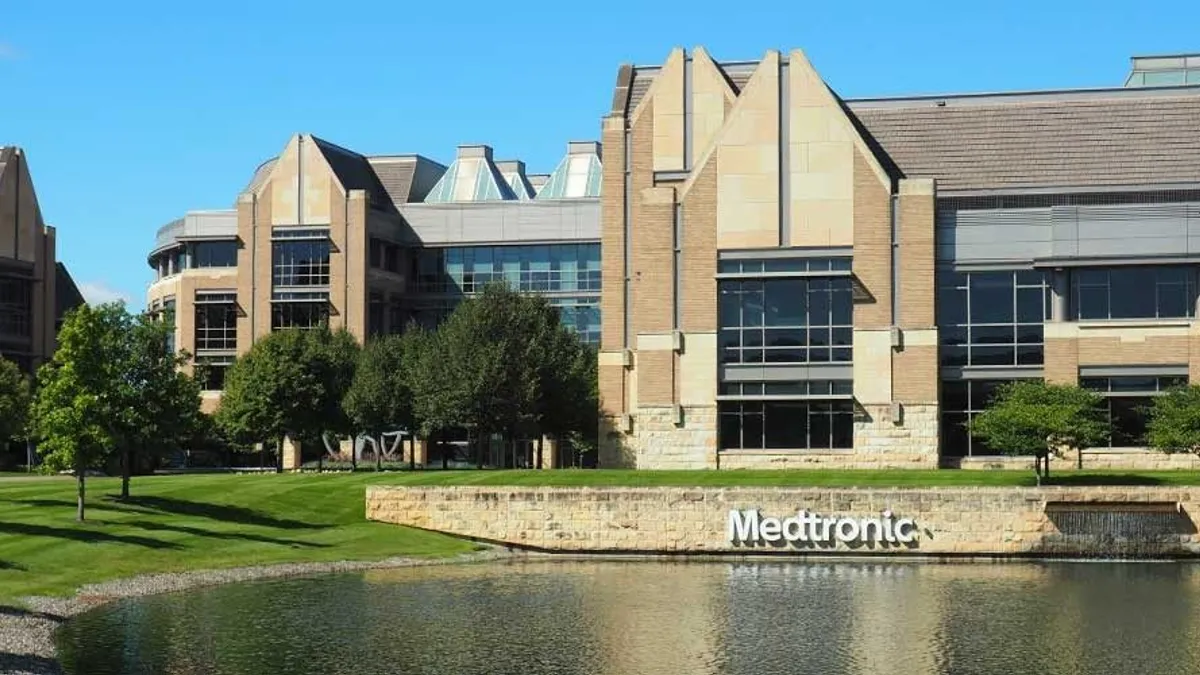Dive Brief:
- Adoption of Medtronic's Mazor robotic surgery platforms and transcatheter aortic valve replacement systems helped the medtech exceed analysts' top and bottom-line expectations for the first quarter of its fiscal year 2020. Reported revenue grew 1.5% to $7.49 billion in the quarter ended July 26.
- Those growth drivers were tempered by declining sales of left ventricular assist devices, softness across the spinal cord stimulation market, tough competition from U.S. diabetes device manufacturers and the still-recovering drug-coated balloons business.
- Building on momentum from the Mazor Robotics integration, the company teased a Sept. 24 investor day which will feature a demonstration of an in-house developed soft tissue robotic surgery platform.
Dive Insight:
Medtronic execs said Mazor's robotic technology, acquired last year for about $1.6 billion, has helped the Restorative Therapies Group gain a foothold in new accounts, with almost three-quarters of Mazor procedures involving other Medtronic implants or instruments.
CEO Omar Ishrak called robotics a "core area" of focus for Medtronic. "In virtually every area where we have a procedural presence, we will look at robotics," Ishrak told investors Tuesday.
While Medtronic declined to specify the number of Mazor systems placed during the quarter, management indicated the technologies supported sales in both the spine and brain therapies businesses, contributing to RTG's 3.2% reported growth during the quarter. Those increases were minimized by a 7% slowdown in spinal cord stimulation sales. Medtronic said the decline mirrored overall market softness; Abbott, for example, reported a 4.6% drop in neuromodulation business in its most recent quarter.
The Cardiac and Vascular Group declined 0.7% in a mixed bag quarter. Medtronic saw a "high-40s" percent decline in left ventricular assist device sales amid tougher comparisons and competition; Abbott's LVAD product received FDA approval as a destination therapy last October.
Drug-coated balloon sales also took a hit during the quarter amid FDA scrutiny of paclitaxel-coated devices' safety, the company said, with case volume reduced by about half in the U.S. and about 40% globally following an agency warning to healthcare providers. Still, Ishrak said Medtronic is "encouraged" following better than expected DCB use following the FDA panel in June and FDA's updated statement suggesting benefits of the devices outweigh risks.
TAVR systems grew in the mid-teens during the quarter, with room to grow further thanks to FDA approval this past Friday for use of its CoreValve Evolut R and CoreValve Evolut Pro TAVR systems in patients with low risk for surgical aortic valve replacement. The PMA supplement could open the procedure to an additional 165,000 patients in the U.S., Western Europe and Japan eligible each year, Medtronic estimated.
Potential benefit from the expanded indication builds on CMS' national coverage determination on TAVR in June, which Medtronic expects will prompt an additional 200 U.S. centers to begin programs, many with which Ishrak said Medtronic is already in "active negotiations."
Although Medtronic touted 3.5% overall growth in diabetes revenues to $592 million thanks to adoption of its insulin pumps and continuous glucose monitors in international markets, its share in the U.S. market fell 5.6% year over year. Ishrak said the first quarter featured "more competitive pressure than we'd like in the U.S." The company's next-generation insulin pump is expected to roll out in the second half of the fiscal year.
Executives reaffirmed expectations for 4% organic revenue growth on the fiscal year; the company achieved 2% growth as reported and 5.5% organic growth in 2019. Guidance for earnings per share was raised from $5.44 to $5.50 to the range of $5.54 to $5.60.
Shares in Medtronic were up more than 4% in morning trading Tuesday.











